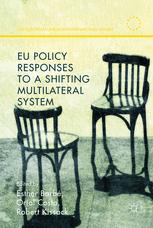

Most ebook files are in PDF format, so you can easily read them using various software such as Foxit Reader or directly on the Google Chrome browser.
Some ebook files are released by publishers in other formats such as .awz, .mobi, .epub, .fb2, etc. You may need to install specific software to read these formats on mobile/PC, such as Calibre.
Please read the tutorial at this link: https://ebookbell.com/faq
We offer FREE conversion to the popular formats you request; however, this may take some time. Therefore, right after payment, please email us, and we will try to provide the service as quickly as possible.
For some exceptional file formats or broken links (if any), please refrain from opening any disputes. Instead, email us first, and we will try to assist within a maximum of 6 hours.
EbookBell Team

4.7
66 reviewsThis book explores how the EU, as an international actor, is adapting to recent transformations in the multilateral system. The international identity of the European Union is built upon its support for effective multilateralism and its commitment to core norms and values. Until recently, there was no need to choose between these goals. Emerging powers in the international system are not only demanding more power in multilateral institutions, but also sometimes seeking to influence their purpose and function, away from those championed by the EU. This presents a dilemma for EU foreign policy – framed in this edited volume as either accommodating changes in order to support multilateral institutions or entrenching the EU position in order to uphold values. Using a common analytical framework, the chapters include case studies on important multilateral institutions such as the United Nations Security Council, the International Monetary Fund, the World Trade Organization and the International Criminal Court, as well as key policy areas such as energy, climate change, nuclear non-proliferation, and human rights.